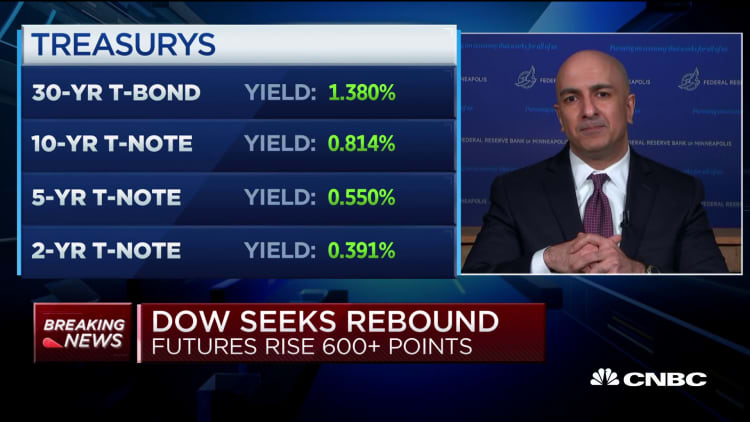
Minneapolis Federal Reserve President Neel Kashkari said the central bank still has monetary policy options to deal with the coronavirus crisis, though negative interest rates still are unlikely.
In a CNBC interview, Kashkari called on Congress to act in situations like a potential bailout for the airline industry. He said the Fed is in the "fourth round" of responders to the crisis, behind health care professionals, the public and Congress.
"We are not at the front line of this," he said on "Squawk Box." "But we do have a job to do and we are using our tools aggressively to try to make sure the financial system is ultimately working."
The Fed thus far has cut its benchmark interest rate to near-zero and instituted asset purchases to total at least $700 billion. Beyond that, it has done a series of big moves into the repo market, where banks go to get their short-term funding, and it has announced several other liquidity measures for the financial system.
The central bank has not yet intervened in the commercial paper market, despite Wall Street's anticipation that help could be needed. Businesses use commercial paper for short-term unsecured financing, and the market has been stressed lately by a lack of buyers.
"I think we're all watching the commercial paper market closely," Kashkari said. "We see the fact that there are strains there. I can't comment beyond that."
Kashkari rejected criticism from some quarters that the Fed should have waited to use its final ammunition on the interest rate front. He compared the predicament to a driver coming up on a hill who accelerates before rather than waiting.
"The notion that we should save our cuts for later is a colorful metaphor, but it's just flat-out wrong," he said.
Fed officials have been asked repeatedly about whether they would consider going to a negative policy rate, a move that essentially taxes deposits as a way to push money off the sidelines and into the system. Kashkari joined his fellow central bank officials in saying that such a scenario is unlikely, though not impossible.
If, for instance, some Treasurys would start to show negative yields, that might push the Fed to steepen what likely would be an inverted yield curve. That has not happened, though.
"I don't think there's much interest in going below zero," Kashkari said. "None of us want to say no, never."
Kashkari helped devise some of the unprecedented measures that saved the economy during the financial crisis — in particular, the Troubled Asset Relief Program, which bailed out the banking industry and ultimately turned a profit for U.S. taxpayers.
He said this crisis is different and doesn't easily lend itself to that kind of program. He discussed the importance of aiding small businesses but did not address any specific moves that could be made.
While he anticipates the U.S. economy will see a recession this year, he said he hopes it's more on the lines of a short, shallow downturn as in 2001 rather than something steeper like what hit the economy from 2007-09.


